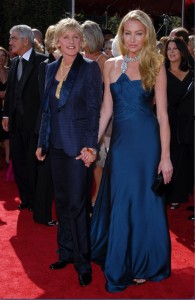In an otherwise very productive year for gay rights, one part of the country surprisingly hasn’t been all too kind to gays. Hollywood, for lack of a better term, has taken gays out of the picture. Not that there aren’t gay characters or gay themes; there certainly are. “The Kids Are All Right” and “I Love You Phillip Morris” centered on gay characters. That’s a step, no doubt, but it isn’t a very big one. In my humble opinion, these movies should not be given the kudos they have gotten because both gay couples were played by straight actors. Julianne Moore, Annette Bening, Jim Carrey and Ewan McGregor are all quite heterosexual. 2010’s “A Single Man,” a story following a day in the life of a gay man, was played by straight actor Colin Firth. Even “Brokeback Mountain” featured two gay characters played by two straight actors, Heath Ledger and Jake Gyllenhaal.

Is this because the audience is not quite ready to see real homosexuality? Does knowing that the actor playing a gay person isn’t really gay make it more tolerable? Despite Hollywood being one of the most gay-friendly towns in America, there seems to be an issue with casting gay actors in gay roles. Actor Rupert Everett, who is openly gay, said, “A lot of straight actors are actively searching for gay roles because it is something different to do. I think that’s fine, but that does mean the gay actor who used to just get to play the gay part — like me — has been reduced to drag, really.” If straight actors play gay characters, it’s considered brave and different. If a gay actor plays a straight role, it’s considered insincere or awkward.
Most actors, and people in general, will say that the details of their private lives are nobody’s business but their own. A role is a role, and the point is to act like someone you’re not. The above-mentioned performances by straight actors were very good, but in a time where it’s really important to be openly gay for the sake of equal rights, it might be best if those in the closet come out. One of the difficulties of gay rights is that many gays aren’t open about their sexuality, which causes several problems, both personal and public.
Sean Hayes, best known for playing the wildly flamboyant Jack on “Will and Grace,” had this problem when he was cast in the Broadway show “Promises, Promises.” He played a straight man that apparently wasn’t so convincing. Newsweek writer Ramin Setoodeh wrote, “it’s weird seeing Hayes play straight. He comes off as wooden and insincere, as if he’s trying to hide something, which of course he is. Even the play’s most hilarious scene, when Chuck (Hayes) tries to pick up a drunk woman at a bar, devolves into an unintentional camp. Is it funny because of all the 60s era one-liners, or because the woman is so drunk (and clueless) that she agrees to go home with a guy we all know is gay?”
Setoodeh sparked some controversy with that review, but he makes a valid point. Sean Hayes is identified as a gay man, so audiences will only see that gay man. It limits the roles he can choose. But the bigger problem is with macho actors like Rock Hudson — now arguably more famous for his life in the closet than for his films. For those actors, sexuality is something to be swept under the rug for the sake of playing a convincing straight man and thus bringing in more viewers. In a society obsessed with analyzing sexuality, once we know an actor is gay, we can’t take him or her seriously when they play straight roles, but we can take straight actors seriously when they play gay roles.
In a time where it really is much easier to be openly gay, it seems one industry is making it much harder than it needs to be. However, Hollywood does its business based on how many people they can cram into a movie theater. Maybe the problem isn’t all Hollywood’s. Maybe some, or perhaps most of the problem, is with the viewers. While America is certainly more OK with gays in the media now than in the past, it has a long way to go as far as accepting sexual orientation and comfortably viewing it onscreen.

